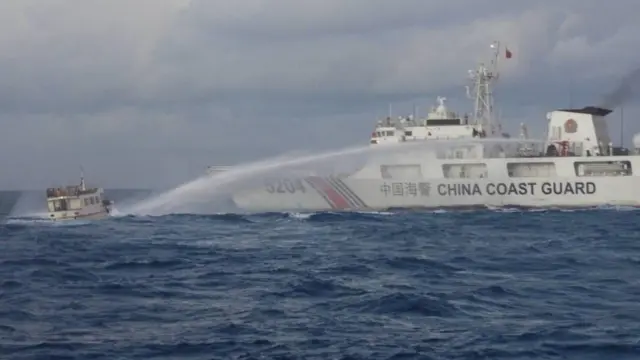
South China Sea tension escalates: China and Philippines in dispute over aggressive vessel collision, accusations fly
MANILA : China and the Philippines are blaming each other after their ships rammed into each other in the South China sea. This conflict comes after they had agreed to work together to reduce tensions and handle disputes at sea. China’s Coast Guard claimed that a Philippine ship ignored multiple warnings and intentionally crashed into a Chinese vessel early Monday morning, calling the incident unprofessional and dangerous.
” The Philippines, on the other hand, challenged China’s version of events, accusing Beijing of “imposing its own version of the facts.” According to the Philippines, two of its coast guard vessels faced “unlawful and aggressive maneuvers” from Chinese ships near Sabina Shoal. The Philippine vessels were en route to deliver supplies to Filipino personnel stationed on two occupied islands.
Jonathan Malaya, spokesperson for the national security council and Manila’s South China Sea task force, stated that these dangerous maneuvers led to collisions, causing damage to both Philippine Coast Guard vessels.
The coast guard vessels, Cape Engano and Bagacay, were going to resupply personnel stationed in Flat Island also called Patag and Lawak Island when the confrontation took place near Sabina Shoal. The China Coast Guard Spokesperson Gan Yu said the vessels illegally intruded in the early hours on Monday near Sabina Shoal. He highlighted the repeated provocation from Philippines and the violation of temporary arrangements between the two countries.
The collision follows the incident of August 11 in which Philippines denounced China’s unjustified, illegal, and reckless action against their plane that was conducting patrols earlier in the week in the disputed South China Sea. China, the Philippines, Taiwan, and Vietnam claim the Escoda or the Sabina Shoal which is in the Spratly Islands.
Beijing due to its expansionist policies claims most of the South China Sea, including shoals despite the 2016 ruling by the Permanent Court of Arbitration in The Hague rejecting Beijing’s expansive claims.

